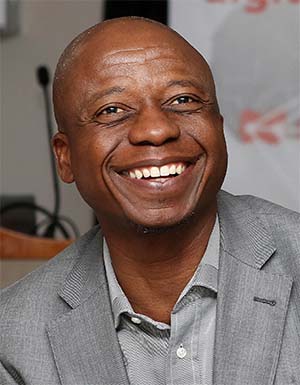The convergence of the 5G and the Internet of Things (IoT) technologies will help create a positive impact on society and on people’s lives if and when it is embraced.
 This is the word from William Mzimba, chief officer for Vodacom Business Enterprise Group, delivering a presentation “5G as a Driver of Economic Inclusion” at the 14th Eastern Cape ICT Summit in East London.
This is the word from William Mzimba, chief officer for Vodacom Business Enterprise Group, delivering a presentation “5G as a Driver of Economic Inclusion” at the 14th Eastern Cape ICT Summit in East London.
In fact, most of the experts at the event agreed that technology will help bring about change in the country in various aspects of society and the industry.
Mzimba also shared his belief that 5G will help bring high levels of internet connectivity, change how we live and work, and will create streams of business that we were not able to create before.
Mzimba strongly believes that without IoT, Vodacom Business would not have been able to introduce its livestock tagging devices. Vodacom is empowering farmers to take proactive measures in order to protect their livestock through the use of technology. Vodacom has created a livestock security collar to help prevent livestock theft, attacks by wild animals and animals getting lost.
Mzimba explains: “This is one of many solutions that display Vodacom’s ability to marry elements of its technology with community upliftment for the greater good of society. By creating shared value through the use of technology, we are able to transform customer relationships with smart technological solutions. Through this solution, Vodacom is leveraging the power of mobile technology to tackle stock theft.”
On the education side, through 5G and IoT, Mzimba says we can now offer education without kids having to leave their homes. “We can take the most qualified teacher from East London and beam them to a rural area, so they can receive the best education possible.
“The social impact of IoT is huge, it goes beyond creating and eliminating jobs. Through this technology, people can educate themselves and people will be able to create new ways of creating jobs. Technology will mechanise mine work, and construction work, but through digital education, people will be able to create jobs that are very different to what we have today. Which is the opposite of the current fear of job loss due to digitisation,” says Mzimba.
In terms of consumer use, Mzimba said that 5G smartphone devices will probably only be available to consumers in the middle of next year. We see the real benefits within the business industry. Consumers won’t really have use cases for it.
“We must remember that every new technology is more efficient than the previous one, 2G better than 3G, 4G better than 3G. 4G and 5G need to support voice. So, naturally, 5G is the next step in our evolution. It will enable homes in water scarce parts of the country to install smart irrigation systems that will save water and connect to the cloud to determine when the sprinklers should come on,” Mzimba said.
